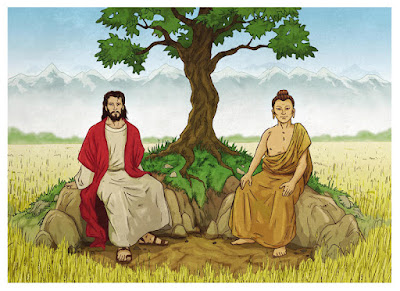Thoughts on Buddhism and Christianity: can you be both or neither?
 |
| Jesus and Buiddha by Xiron/Deviant Art |
For Kelly Ann Morrow
Recently, I was reminded of how notions of religious practice and/or dogma intersect with secular custom and why I really don’t like to identify as a Buddhist (although, yes, I am a card-carrying member thereof of the Tibetan variety.) I tend to keep my affiliation private and if someone knows my history, then fine, I’m happy to represent.
I am not always certain that some Buddhists would want me to do so, perhaps for some reasons that we may encounter here.
Buddhism isn’t monolithic. This tends to rub some practitioners the wrong way, but it’s frankly obvious. Just as Christianity isn’t monolithic. Or any other group, tradition, or for that matter, individual. We - all of us - contain multitudes.
That being said, the question surrounding how different practitioners encounter the world is likely to vary. An amusing - well, to me - example is, do or can Buddhists celebrate Halloween? Sure, I’ll bet there are some conservative Buddhists who might see something unwholesome in the festivities (just as there are Christian sects who don’t care for the holiday); but for the most part, I’m willing to go record as saying as most modern Buddhists are fairly indifferent to or actively enjoy the day, like me!
There are as many different responses to these questions as there are Buddhists and Christians. However, can you practice both?
I’d say it depends on how you relate to each tradition. Doctrinally, both can be complex enough to allow for a kind of syncretic relationship, but I wonder if that’s forcing round pegs into square holes or vice versa. The nineteenth and early twentieth centuries saw a number of movements that fused both, and Huxley's Perennial Philosophy was key in leading to various interpretations that saw all religions as one...or One.
In broad terms, there are general points of divergence. Christianity posits a single creator deity, very often seen through a prism of human interpretation that acts out of love and dispenses justice or grace accordingly. Buddhism conceives its phenomenology as the result of causes and conditions that find their origin as stemming from ignorance in not perceiving the world correctly. This is overcome through compassion and wisdom. In both traditions - and again, I am speaking so broadly, so very broadly - the onus is on the individual to act ethically, lovingly, and so on.
Sotriologically, there is another divergence. In the Abrahamic traditions, God is judge as well as creator and consequently, beings are consigned to an eternity of torment or an eternity of paradise or an eternity - in some derivations - of limbo. Buddhism posits cycling through different realms according to karma accrued numerous lifetimes but with the potential to work off the negative karma over eons of rebirth until purification is total and full awakening to buddhanature is attained.
In both traditions there branches and nuances and myriad approaches that present different approaches and operational modes for being-in-the-world. Christianity can be and has been refracted via a lens of metaphysics whereby God is (the) Absolute, and all phenomenal creation is His/Her manifestation, already whole but where said wholeness is obscured by limited human views and clinging to the phenomenal is a stumbling block. Buddhists would find this easy to map to. The differences might be that Buddhists would claim that recognizing one’s God-like or Christlike nature is not the same as full awakening and therefore, untenable as a personal practice for liberation.
There are arguments that Christian and Buddhist hermeneutics are themselves the issue. The Kingdom of Heaven is Nirvana, being born in a pure realm is the result of the expiation of karma or God’s grace. I have known people who feel this interpretative strategy allows them to be toth good practicing Buddhists and good practicing Christians (and Jews, and Sufis, etc.)
My personal feelings, which should only matter to me, are flexible. I don’t find clinging to definitions or views particularly helpful, not even Buddhist ones. The issue is in the clinging. Buddha himself warned of the danger of clinging to views, of making sure to test all assertions (even his). Where I find Christ and Buddha most certainly align is in basic goodness and acting from a base of compassion. Wisdom is the other wing for Buddhism in the sense of knowing what means to utilize compassionate action or response and differentiating chaff from wheat, if you will. Similarly, this methodology is found in Christianity, as well.
There is much I still love and admire in Christ’s teachings and I do find myself calling to mind various scriptures that are deeply relevant at any given time. I simply find Buddhism more comprehensive, thorough, and in its approaches to daily life more practical; as well as the psychological and soteriological elements more digestible and profound. But this is just me; mileage among others may vary.
The Guardian had an article where readers wrote in about this issue and you’ll find the answers are varied, as should be expected.
In any case, I wish for you to find solace, satisfaction, and support in the world however you need it, however it comes to you. Love transcends our traditions, wisdom is innate in the universe; that actually resonates with me as much as any sutra or tantra or biblical text.



Comments
Post a Comment